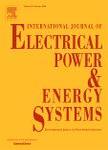版权所有:内蒙古大学图书馆 技术提供:维普资讯• 智图
内蒙古自治区呼和浩特市赛罕区大学西街235号 邮编: 010021

作者机构:Dr BC Roy Engn Coll Dept Elect Engn Durgapur W Bengal India
出 版 物:《INTERNATIONAL JOURNAL OF ELECTRICAL POWER & ENERGY SYSTEMS》 (国际电力与能源系统杂志)
年 卷 期:2013年第53卷第1期
页 面:85-94页
核心收录:
主 题:Unit commitment Generation scheduling Spinning reserve Ramp rate Gravitational search algorithm Law of gravity
摘 要:In this article, gravitational search algorithm (GSA) is proposed to solve thermal unit commitment (UC) problem. The objective of UC is to determine the optimal generation of the committed units to meet the load demand and spinning reserve at each time interval, such that the overall cost of generation is minimized, while satisfying different operational constraints. GSA is a new cooperative agents approach, which is inspired by the observation of the behaviors of all the masses present in the universe due to gravitation force. The proposed method is implemented and tested using MATLAB programming. The tests are carried out using six systems having 10, 20, 40, 60,80 and 100 units during a scheduling period of 24 h. The results confirm the potential and effectiveness of the proposed algorithm compared to various methods such as, simulated annealing (SA), genetic algorithm (GA), evolutionary programming (EP), differential evolution (DE), particle swarm optimization (PSO), improved PSO (IPSO), hybrid PSO (HPSO), binary coded PSO (BCPSO), quantum-inspired evolutionary algorithm (QEA), improved quantum-inspired evolutionary algorithm (IQEA), Muller method, quadratic model (QM), iterative linear algorithm (ILA) and binary real coded firefly algorithm (BRCFF). (C) 2013 Elsevier Ltd. All rights reserved.